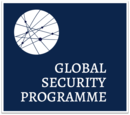News and Events
GSP Talks: Dr Ranj Alaaldin – Presentation by our Visiting Fellow
Join us at this talk with Dr Ranj Alaaldin
Pembroke College – Eccles Room
28 February, 5:00 PM
RSVP: globalsecurity@pmb.ox.ac.uk
OPEN POSITION: Programme Officer
Join the Minerva Global Security Programme @BlavatnikSchool, @UniofOxford
https://bsg.ox.ac.uk/job-programme-officer-minerva-global-security-programme
The closing date for applications is 12:00 noon (UK time) on Monday 26 February 2024.
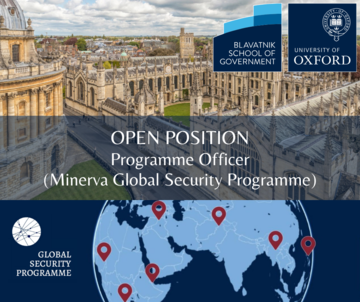
GSP Newsletter Jan 2024
🌐 Explore our Global Security Roadmap
Global security consists of political, economic, and social dimensions. Understanding global security requires identifying how these dimensions interact with each other dynamically. Our roadmap provides guidance to government officials, civil society actors, academics, and private companies on how to best analyse and think about global security.
The Global Security Programme at Oxford University’s Pembroke College and the Blavatnik School of Government co-hosted a webinar series with 27 world-renowned expert speakers from academia, civil society, and government to discuss and reflect on how to productively think about and analyse global security.
We supplemented the findings from our webinar series with an extensive review of the global security literature. This roadmap synthesises the key insights from both the webinar series and our literature review to derive key recommendations that can inform better security policy and programming design.
Our roadmap aims to enhance the lives of individuals living under conditions of insecurity.
You can download our roadmap here:
https://globalsecurity.web.ox.ac.uk/article/global-security-roadmap
#GlobalSecurity #Roadmap #Oxford
Postdoctoral roles in the Minerva Global Security Programme
🌍 Join the Minerva Global Security Programme.
Have a look at these two Postdoctoral roles in the Minerva Global Security Programme with Dr Annette Idler.
https://www.bsg.ox.ac.uk/job-postdoctoral-research-fellow-minerva-global-security-programme-0
https://www.bsg.ox.ac.uk/job-postdoctoral-research-fellow-minerva-global-security-programme-middle-east
#hiring #oxforduniversity #blavatnikschool #globalsecurity
Applications OPEN for our Visiting Fellowship!
Applications OPEN for our Visiting Fellowship! An excellent chance for academics/practitioners. Fostering intellectual growth for a career boost in global security or related fields.
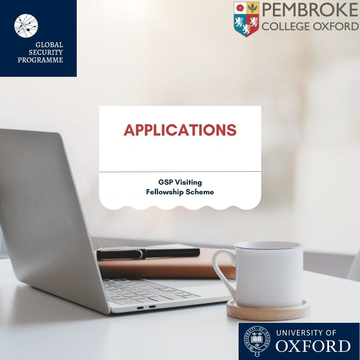
Apply now!
https://globalsecurity.web.ox.ac.uk/visiting-fellowship-scheme
#VenezuelaReferendum sparks concerns over potential implications for regional stability: Annette Idler's interview for France 24
#VenezuelaReferendum sparks concerns over potential implications for regional stability. Could it open the door for unforeseen events in the #Guyana border dispute? Dive into expert insights with @AnnetteIdler's interview on : @FRANCE24:
🎙 Also available in:
🇫🇷 French: https://france24.com/fr/am%C3%A9riques/20231202-le-venezuela-se-pr%C3%A9pare-t-il-%C3%A0-faire-main-basse-sur-une-partie-du-guyana
🇮🇹 Italian: https://byoblu.com/2023/12/04/venezuela-tensione-con-la-guyana-in-ballo-petrolio-e-risorse-naturali/
🇷🇸 Serbian: https://klix.ba/vijesti/svijet/referendum-o-essequibou-hoce-li-venecuelanci-danas-oteti-dio-gvajane-i-odvesti-regiju-u-rat/231203093
🇭🇷 Croatian: https://www.b92.net/info/vesti/index.php?yyyy=2023&mm=12&dd=03&nav_category=78&nav_id=2444427
Now available! 📢 special issue on ‘Change in Armed Conflict
Special Issue Launch Event: Change in Armed Conflict
Join us to launch a Special Issue of @IPSR_Journal, edited by @AnnetteIdler, which examines change in armed conflict through multidisciplinary lenses spanning psychology, economy, visual arts and international relations.
4 Dec, 16:00 (UK)
Global Security Programme collaboration with UNSSC advances UN’s conflict analysis capacity
Exciting news!
We're proud to collaborate with United Nations System Staff College to enhance the UN's conflict analysis capabilities. Our partnership has led to a dynamic cross-stakeholder forum and the release of impactful reports. Explore our journey and these reports here:
Work with us! Current vacancy:
Participation in two panels at the American Political Science Association Congress #APSA2023
@SkyNews interview: Competition over #drugtrafficking routes from #Colombia via #Ecuador
#BBCNewshour interview: ceasefire between the Colombian ELN and the government.
Cross-Stakeholder Forum Reports: Understanding Changing Conflict Dynamics in Myanmar and the Horn of Africa
🌍Cross-Stakeholder Forum Reports. Alongside International Alert, the Danish Refugee Council, and the UN System Staff College, we've gathered insights on Myanmar & Horn of Africa conflicts: changing dynamics, community impacts, and good local practices. You can now download the reports here: https://globalsecurity.web.ox.ac.uk/article/networks-for-change
#GlobalSecurity
Professor Annette Idler speaks to the BBC about historical Colombian ceasefire.
Professor Annette Idler speaks to the BBC about the historical ceasefire signed by the Colombian government and the ELN. Professor Idler and other guest speakers discuss what this means for Colombia and what we can expect to happen, listen to it here: https://lnkd.in/e5h2XReu
Global Security Webinar Series
The Global Security Programme at Pembroke College alongside the Minerva Global Security Programme at the Blavatnik School of Governance have launched a new webinar series exploring different dimensions of global security.
This is an 8-part virtual series hosted by our founder Dr Annette Idler. Every week Dr Idler, alongside our distinguished guest panellists, use their expertise to explore some of the most challenging and pressing topics in global security. Click on the webinar title for more details.
1. Thinking about Global Security
-
15 Feb 2023, 2:00-3:00pm GMT
2. Methodologies and Epistemologies in Global Security
-
22 Feb 2023, 12:00-1:00pm GMT
3. Spaces and Scales in Global Security
-
1 Mar 2023, 12:30-1:30pm, GMT
4. Global Security and its Political Dimension
-
8 Mar 2023, 12:00-1:00pm, GMT
5. Global Security and its Economic Dimensions
- 26 Apr 2023, 12:00-1:00pm, GMT
6. Global Security and its Social Dimensions
- 3 May 2023, 12:00-1:00pm, GMT
7. Global Security and the Dynamic Interactions between its Dimensions
- 10 May 2023, 12:00-1:00pm, GMT
8. The Future of Global Security
- 17 May 2023, 12:00-1:00pm, GMT
This series is generously funded by the DT Institute.

Dr Annette Idler speaks as a panellist at RUSI Latin American Security Conference 2023
As a panellist at the RUSI Latin American Security Conference 2023, Dr Annette Idler spoke on cross border security and how Latin American states can more effectively combat transnational organised crime. Click here for more information about the event.
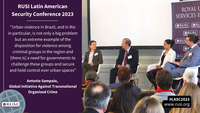
Dr Annette Idler speaks as a panellist at the Marxe School of Public and International Affairs' Rountable: Multi-Method Research in Difficult Places
The Marxe School of Public and International Affairs at Baruch College, City University of New York will convene a roundtable on research in challenging environments. The session will bring together scholars, including our very own Dr Annette Idler, who have conducted qualitative and quantitative research in a variety of countries including Afghanistan, Mynamar, and Colombia to discuss the challenges of conducting research in these locales and strategies to overcome these issues.
The event will take place on the 10th of March at 3pm-5pm GMT.
Registration link: https://baruch.zoom.us/meeting/register/tZckc-usqDksH9wRVIlAqVokTURAm3ck...
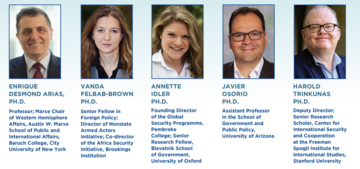
Podcast alert: Dr Dáire McGill speaks about his research 'Transforming Experiences of Citizen Security?'
As part of the TJ Mini-Series Episode 2: Citizen Security and Transitional Justice, Dáire introduces the concept of citizen security and its relevance to transitional and transformative justice through engendering participatory processes and strengthening state-citizen relationships, drawing on the case studies of Colombia and Northern Ireland.
Click here to listen: https://lawpod.org/podcast/beyond-tj-mini-series-episode-2-citizen-secur...
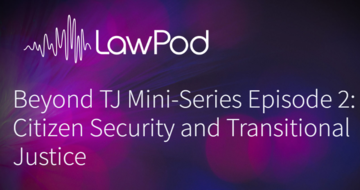
Podcast by Dr Annette Idler: Understanding Security – What makes migrants and their host countries feel safe or unsafe in times of crises?
At any one moment, at least a few regions of the world are undergoing great social upheaval. From war and economic collapse to crime and pandemics. What follows are often large flows of people fleeing the situation. But this can also create dramatic changes in how people feel about their security, and not just in the home country itself, but also in the neighbouring countries that people flee to. How exactly citizens living through these situations react, and what influences their sense of security is something that Dr. Annette Idler, of the University of Oxford examines. In our conversation about her current project "Transitions and Social Cohesion in Context of Multiple Crises" which she is leading along with Freie Universität Berlin professor Sérgio Costa, we talk about what it really is that influences people's perceptions and experiences of security. And to what extent refugee flows and organized crime matter in the breakdown of social cohesion.
Click this link to listen to the podcast.
We're hiring! Postdoctoral Research Fellow for the Minerva Global Security Programme
We are looking for a Postdoctoral Research Fellow to contribute to our Minerva Research Institute funded, Global Security: Contested Space, Illicit Flows, and Order in the Contemporary World, project at the Blavatnik School of Government!
The closing date for applications is January 16th 2023.
For the full job description and to apply, please click here.
Dr Annette Idler chairs book launch at Blavatnik School of Government
On December 5th 2022 at the Blavatnik School of Government, Dr Annette Idler chaired the launch of Dr Nematullah Bizhan's new book, 'State Fragility', which examines critical questions as to the nature of state fragility, policies used to mitigate it, assessment of outcomes, and prospects.
Watch the live stream of the event here:
Dr Dáire McGill participates in Colombian Truth Commission workshop at the University of Bristol
Dr Dáire McGill has been invited to participate in a workshop with Colombian Truth Commissioner, Alejandra Miller, on Friday 4th November at the University of Bristol.

Dr Annette Idler speaks at the Middle East Peace & Security Forum at the American University of Kurdistan
Dr Annette Idler was invited to speak at the 2022 Middle East Peace & Security Forum at the American University of Kurdistan in Duhok, Iraq (November 15th-17th). Dr Idler was invited to participate in the "The Future of the West in the Middle East" panel at the MEPS public forum alongside fellow scholars and practitioners.

Dr Annette Idler to speak at the 24-Hour Conference on Organised Crime on October 13th
Dr Annette Idler will be speaking at a panel about her book, edited alongside Juan Carlos Garzòn Vergara, 'Transforming the war on drugs: Victims, warriors, and vulnerable regions" (2021) at the 24-hour Conference on Organised Crime this Thursday, October 13th 2022 at 7pm. The panelists are a number of contributing authors to the book including Dr Idler, Juan Carlos Garzón Vergara, Carlos Pérez Ricard, John Pokoo and Mònica Serrano.
Sign up to watch the panel here.
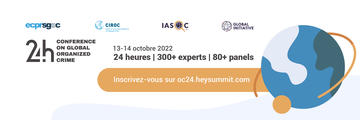
Global Security: From Evidence-Based Research to Networked Impact
We are delighted to announce that the Global Security Programme (GSP) has been awarded a grant by the DT Institute for a 12-month long project aimed at producing rigorous academic research that will help improve the lives of individuals and communities suffering from conflict and insecurity. The DT Institute, part of the DT Global Family network, is a non-profit specialising in international development assistance, catalytic philanthropy, and applied research globally. It acts as both a funder and an implementer of peace and development projects.
Working closely with the DT-Institute, GSP will receive $50,000 over the next academic year to advance our collective evidence-based understanding and theories of global security. The project aims to produce more participatory and globally representative security studies and International Relations.

Dr Markus Hochmüller presents at University of Cambridge conference
On September 22nd 2022, Dr Markus Hochmüller presented his research during the 'Policing Empire' panel at the 'Beyond Militarism' Conference at the University of Cambridge, alongside his colleague Professor Markus-Michael Müller. Dr Hochmüller was presenting the findings from GSP's Colombia Lessons? project in a work entitled, 'Between "global reference" and "indigenous malice": Modelling planetary counterinsurgency the Colombian way'.
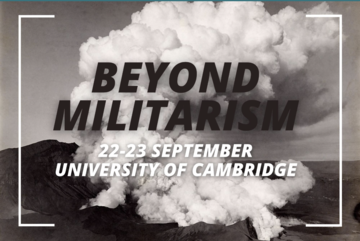
Dr Annette Idler speaks at the International Security section of the 2022 APSA Annual Meeting & Exhibition
At the American Political Science Association 2022 Annual Meeting & Exhibition Dr Annette Idler was invited to speak as part of the International Security Section of the conference on the Rebellion, Insurgency, and Counterinsurgency panel on September 17th 2022. Dr Idler presented the findings of her research entitled, 'Security Beyond Borders: Violent Non-state Actors as Challenge to the State'.

Dr Dáire McGill participates in the Political Power, Criminality and Conflict Conference at Dublin City University
Dr Dáire McGill served as a participant in the ‘Political Power, Criminality and Conflict Conference’ organised by the International Institute for Conflict Resolution and Reconstruction at Dublin City University on 16th September 2022. The conference aimed to contribute to a better understanding of the ways in which criminality and politics interact in civil war.
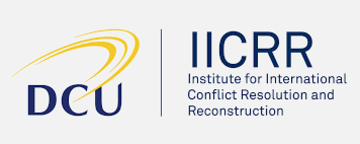
Dr Dáire McGill chairs and presents at the 2022 Conflict Research Society Conference
On September 9th 2022 at the Conflict Research Society Conference, Queens University Belfast, Dr Dáire McGill served as a Chair and Discussant on the International Conflict panel and later presented his research entitled, ‘From Secession to Sense of Belonging: Why Transnationality in Conflict Matters’.

Dr Annette Idler presents research in Beirut at UNOSSC/ESCWA round table discussion
On July 29th 2022, Dr Annette Idler presented her global security research findings and methodologies at the UNOSSC/ESCWA round table discussion in the ESCWA headquarters, Beirut, Lebanon. In addition, Dr Idler led the second session of the round table discussion which focused upon the 'Role of Central and Local Governments in Addressing Social Justice under Conflict and Fragility'.
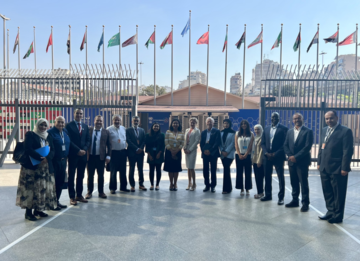
Dr Annette Idler speaks at Harvard Humanitarian Initiative Webinar
On July 28th 2022, Dr Annette Idler appeared as a guest speaker alongside other experts at the, 'Executive Negotiation Project's Thematic Briefing: Tools and Approaches in Negotiation with Non-State Actors' webinar and discussion for the Harvard Humanitarian Initiative.
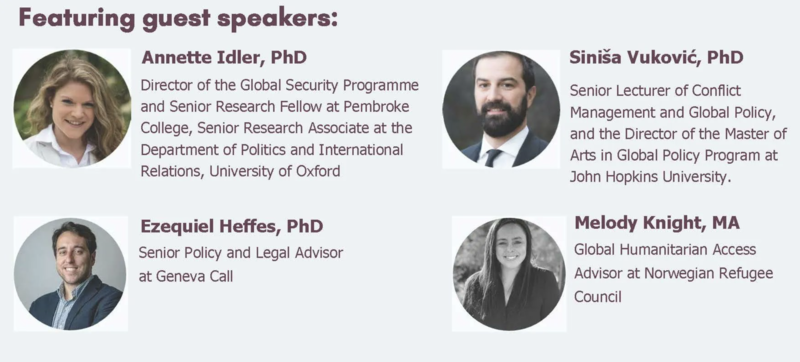
Global Security: Contested Space, Illicit Flows, and Order in the Contemporary World
The Global Security Programme has been awarded a grant by the US Department of Defence as part of their 2021 Minerva Research Initiative. The Minerva Research Initiative supports social science research aimed at improving our basic understanding of security, and with particular relevance to US national security.
The Global Security Programme has been awarded a grant by the US Department of Defence as part of their 2021 Minerva Research Initiative. The Minerva Research Initiative supports social science research aimed at improving our basic understanding of security, and with particular relevance to US national security.
The Global Security Program: Contested Space, Illicit Flows, and Order in the Contemporary World will receive $3.5m over the next five years to investigate "how and under what conditions governance arrangements among violent non-state actors and state actors in contested cross-border spaces emerge, shift, and eventually catalyse global security threats via global illicit supply chain networks".
“I feel very honoured that our project on “Global Security Program: Contested Cross-border Spaces, Illicit Flows, and Order in the Contemporary World” was awarded a Minerva Research Initiative grant. This will allow us to tackle hard questions on how to enhance global security in a world that is increasingly interconnected – both in the upper- and the underworld,” said Dr Idler.
The Minerva Research Initiative supports social science research aimed at improving our basic understanding of security, and with particular relevance to US national security. The overall award amount is $28.7m and only 17 programmes were selected among 220 applicants. Oxford is the only non-US university.
Dr Markus Hochmüller and Dr Dáire McGill organise a Civil Society Workshop in Cali, Colombia
On July 28th 2022, Dr Dáire McGill and Dr Markus Hochmüller served as organisers of the Civil Society Workshop, ‘Holistic Peace and Security practices: Territorial experiences and National coordination’ at ICESI University, Cali, Colombia.
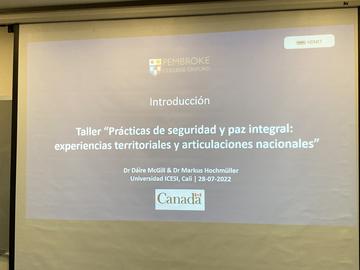
Dr Dáire McGill celebrates the launch of the edited volume 'Beyond Transitional Justice: Transformative Justice and the State of the Field (or non-field)'
On May 31st 2022, Dr Dáire McGill celebrated the book launch of the edited volume Beyond Transitional Justice: Transformative Justice and the State of the Field (or non-field), which included a presentation of his chapter within the work ‘Transforming Experiences of Citizen Security?’
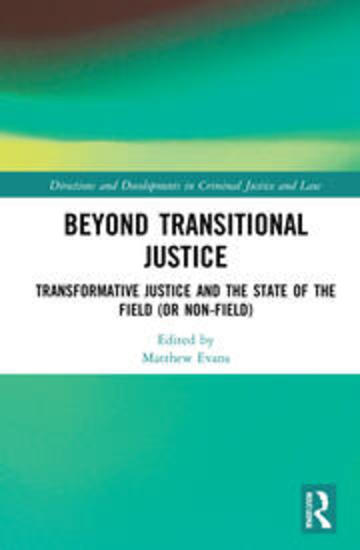
Dr Annette Idler wins the 2022 Premio Iberoamericano Book Award
Congratulations to Dr Annette Idler, Director of the Global Security Programme and Senior Research Fellow at Pembroke, for receiving the 2022 ‘Premio Iberoamericano’ for her book Fronteras Rojas: Una Mirada al Conflicto y el Crimen desde los Márgenes de Colombia, Ecuador y Venezuela (Penguin Random House, 2021).
Since 1992, this award has been given annually to the outstanding book, published in Spanish or Portuguese, on Latin America in the social sciences and humanities. It is then announced at the Latin American Studies Association (LASA) Welcome Ceremony.
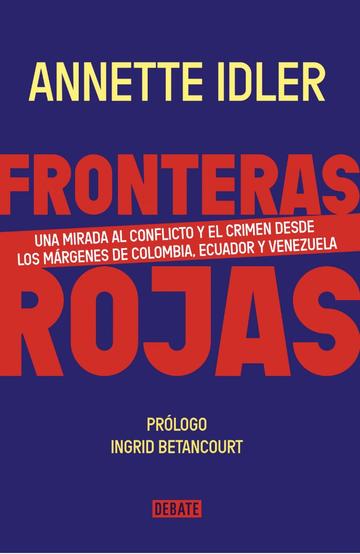
Annette Idler Presents her Research on the Logic of Violent Nonstate Group Interactions at ECDAS
In this seminar, based on an article published in World Politics, ‘The Logic of Illicit Flows in Armed Conflict’ (2020), Dr. Annette Idler analyses why there is variation in how violent nonstate groups interact in armed conflict.
- Presenter: Dr. Annette Idler, Visiting Scholar, Weatherhead Center for International Affairs, Harvard University; & Director of Studies, Changing Character of War Centre, University of Oxford
- Discussant: Dr. Michael Weintraub, Associate Professor, School of Government, Universidad de Los Andes
- Convener: Dr. Gwen Burnyeat, Junior Research Fellow in Anthropology, Merton College & member of Embrace Dialogue
Please register to attend this event.
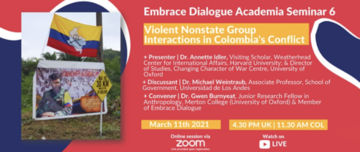
Uncertainty in War and Peace: The Security Impacts of Changing Orders talk by Dr Annette Idler
In this talk, Dr Annette Idler discusses her work as Principal Investigator of the multi-year AHRC-ESRC funded project “The Changing Character of Conflict Platform: Understanding, Tracing, and Forecasting Change across Time, Space, and Cultures” (www.conflictplatform.ox.ac.uk). The Conflict Platform promotes dialogue across methodologies and epistemologies, bringing together large data analysis with ethnographic fieldwork, complexity science, visualisation techniques, visual arts, and historical tracing back to the Thirty Years War. As part of this effort, she studies how changing orders during armed conflict as well as changes from war to peace impact on communities and societies. She argues that, in settings of armed multiparty conflicts, changes such as ceasefires or the demobilization of an armed actor induce uncertainty because the previously existing order and the rules of behaviour attached to it are no longer available. Uncertainty, in turn, undermines people’s security, reduces collective action, and diminishes the prospects of a prosperous society. The study is based on extensive fieldwork conducted in and on three hubs of instability that stand out through their protractedness and the convergence of armed conflict and organized crime: Colombia, Myanmar, and Somalia.
Click here to join the event (Zoom link).
Dr Markus Hochmüller will be panelist on the Latin American Geography Panel Discussion
4 February 2021, Dr Hochmüller will be presenting some updates on the paper "Covid-19 in Colombia's Borderlands and the Western Hemisphere: Adding Instability to a Double Crisis" written by Dr Annette Idler and Dr Markus Hochmüller on Volume 19, July 2020. Register Here: https://bit.ly/3cgSAoY
Article praising CONPEACE work on The Research Impact Website of the University of Oxford
After winning the Early Career prize, the research impact division of the University of Oxford wrote an article on Dr Idler and the Conflict Platform and CONPEACE work.
New Research Project on Colombian Security Cooperation
CONPEACE will host the new research project “Colombian Lessons? Assessing the Practical and Normative Consequences of Latin American South-South Security Cooperation”. In cooperation with Professor Markus-Michael Müller (Roskilde University), CONPEACE Postdoctoral Research Fellow Dr Markus Hochmüller will examine the effectiveness, empirical legitimacy, and local impact of Colombian security cooperation in Latin America. The two-year project is funded by the Gerda Henkel Foundation’s Special Programme Security, Society and the State. Please find more details here.
Unidad Policial para la Edificación de la Paz (UNIPEP) invited Dr Idler to participate on the II Peace Building Congress
UNIPEP invited Dr Idler to share CONPEACE and the Conflict Platform's work about peacebuilding and rethinking security on the "II Congreso Internacional de Género y Construcción de Paz en el Servicio de Policía".
Dr Idler was interviewed by The Weatherhead Center for International Affairs at Harvard
The Weatherhead Center published two interviews with Dr Idler about her work on the Conflict Platform and CONPEACE, and how these evaluate life in the borderlands, and reinvented the way in which insecurity can be tracked across time and space.
Part 1: Armed Groups are Watching You: Life in the Borderlands
CCW seminar: The Power of Uncertainty: How Change in Conflict Influences Security by Dr Annette Idler
In this talk, Dr Annette Idler will discuss preliminary findings of the multi-year AHRC-ESRC funded project “The Changing Character of Conflict Platform: Understanding, Tracing, and Forecasting Change across Time, Space, and Cultures”. First, she will present a general overview on how the Conflict Platform promotes dialogue across methodologies and epistemologies, bringing together large data analysis with ethnographic fieldwork, complexity science, visualisation techniques, visual arts, and historical tracing back to the Thirty Years War. She then will focus on the following question: How do changes in armed conflict influence people-centred security? In settings of armed multiparty conflicts, it is argued, changes such as ceasefires or the demobilization of an armed actor induce uncertainty because the previously existing order and the rules of behaviour attached to it are no longer available. Dr Idler demonstrates that the extent to which change and increased levels of uncertainty impact negatively on security depends on people’s prior experiences of non-state order: namely enmity, rivalry, or friendship among violent non-state groups. This study is based on extensive fieldwork conducted in and on three hubs of instability that stand out through their protractedness and the convergence of armed conflict and organized crime: Colombia/Venezuela, the Golden Triangle (with a focus on Myanmar) and the Horn of Africa (with a focus on Somalia).
Annette Idler is the Director of Studies at the Changing Character of War Programme, Senior Research Fellow at Pembroke College, and at the Department of Politics and International Relations, and Affiliate at the Latin American Centre, all University of Oxford. She is also Research Associate at the Graduate Institute Geneva’s Centre on Conflict, Development and Peacebuilding, serves as Advisory Board Member for the German Journal of Strategic Analyses, and as International Advisory Committee Member for the Dutch Organization for Scientific Research.
Idler’s work focuses on the interface of conflict, security, transnational organized crime as well as terrorism, peacebuilding and governance. She is particularly interested in the role that diverse types of violent non-state groups play in these dynamics. Drawing on ethnographic methods in her work, over the past decade, she has conducted extensive fieldwork in and on war-torn and crisis-affected regions of Colombia, Ecuador and Venezuela.
Idler advises governments and international organizations, is a regular expert for media outlets such as Al Jazeera, BBC and the Washington Post, and has published numerous policy briefs. Idler previously worked with UNDP’s Bureau for Crisis Prevention and Recovery, the UN Economic Commission for Latin America and the Caribbean, and GIZ. She holds a doctorate from the Department of International Development, University of Oxford, and an MA in International Relations from King’s College London’s Department of War Studies.
Microsoft Teams Meeting: Please email info@ccw.ox.ac.uk to be invited.
This event is part of the Changing Character of War Center seminar series. See the Michaelmas term card for more information.
Webinar: Rethinking Conflict, Building Peace with Dr Annette Idler and Juan Manuel Santos
Join Dr Annette Idler and Juan Manuel Santos, former President of Colombia (2010-2018) and recipient of the Nobel Peace Prize (2016) for a webinar Rethinking Conflict, Building Peace celebrating the Vice-Chancellor’s Innovation Awards 2020. Juan Manuel Santos will talk to Annette Idler about her work on dynamic conflict changes and their consequences for people-centred security.
>> Live on YouTube <<
Dr Idler's participation on the Geneva Peace Week 2020
During the Geneva Peace Week 2020, Dr Idler had the pleasure to participate in the podcast "How can peace mediation stay relevant in the post-COVID world?" Listen here
Article praising CONPEACE work on The Research Impact Website of the University of Oxford
After winning the Earle Career prize, the research impact division of the University of Oxford wrote an article on Dr Idler and the Conflict Platform and CONPEACE work.
We invite you to have a glimpse of what we do to rethink conflict and build peace in Colombia's borderlands. https://www.ox.ac.uk/research/research-impact/rethinking-conflict-building-peace
New CONPEACE brief analyses sexual and gender-based violence in the border
The policy brief "Gendering the Border Effect: Sexual and Gender-Based Violence in the Midst of Insecurity and a Refugee Crisis" written by Dr Zulver and Dr Idler addresses the risks faced by women, girls, and LGBTI community in the border between Colombia and Venezuela. See Related Publications.
Call for Papers CONPEACE Panel Lasa 2021
The double-panel "Changing Security Landscapes at the Margins – Bridging the Centre-Periphery Gap" is organised by CONPEACE and welcomes applicants to submit paper title, abstract and short bio before August 16, 2020. More Info
Dr Annette Idler's latest publication for World Politics
"The Logic of Illicit Flows in Armed Conflict: Explaining Variation in Violent Nonstate Group Interactions in Colombia" Available here
New article by Dr Idler and Dr Hochmüller for The Conversation
"Venezuelan migrants face crime, conflict and coronavirus at Colombia’s closed border" is now available. 5 June, 2020
Dr Masullo and Dr Zulver just released an article for Political Violence at a Glance
"In War-Torn Colombia, One Community Stands Up To Outsiders" is now available. 27 May, 2020
From Borders to Borderlands
Lessons learnt from the Danish Demining Group Border Security Management experience in East Africa, Sahel and North Africa
Natasha Leite, Danish Refugee Council
A light sandwich lunch is served at 12.50pm. All are welcome.
Borderlands are often space where the nexus between economic development, conflict, crime, politics and identity are at its most dynamic. Breaking the State-centric nature in which most organisations and country-structures operate, borderlands provide a significant challenge for engagement that has yet to be addressed in a meaningful way. As agencies, organisations, donors have and still struggle with the complexities of borderlands beyond securitised approaches, this presentation will hopefully shed a few learnings from DDG’s decade of borderlands work in protracted conflict zones and share how, practically, we were able to move from a “border” to a “borderlands” lens. This will be drawn from DDG’s work in the Uganda-Kenya-Somalia (Karamoja cluster and Mandera triangle); the Sahel (Liptako Gouma region) and the Tunisia-Libya border (Ben Guerdane, Dehiba, Zuwara, Nalut, and Wazin).
DDG’s approach to promoting stability and development in borderlands areas, like DDG’s overall approach is community-driven and protection-focused. It is important to acknowledge that in protracted conflict contexts, the central government and the Borderlanders tend to have very different perceptions of “borders”, their lived and historical experience. Furthermore, national governments usually lack the capacity and resources to effectively put in place mechanisms to facilitate cross-border and regional coordination to address security threats and promote holistic development. In these contexts particularly, there is an important space for external actors to promote local voices and solutions as well as to allow governments to better respond to communities’ needs.
This presentation will focus on the main challenges for practitioners working in borderlands; main achievements/solutions during this last ten years in the three regions mentioned and finally, key lessons learnt and recommendations for future work.
As the regional technical lead for Security and Governance in East Africa and the Great Lakes for the Danish Refugee Council/Danish Demining Group, Natasha Leite guides and expands impact-oriented programming. She provides technical guidance and support to country-level project teams in violence reduction interventions and framework. Natasha Leite is a peacebuilding and rule of law professional offering a proven track record of fourteen years delivering results in Latin America, the Caribbean, Sub-Saharan Africa and the Pacific.
Book Review: "From Transitional to Transformative Justice" by Dr Dáire McGill
Social & Legal Studies. https://doi.org/10.1177/0964663920914001 20 March, 2020
Dr Julia Zulver and Dr Annette Idler's New Article in Third World Quarterly
"Gendering the border effect: the double impact of Colombian insecurity and the Venezuelan refugee crisis" is now available in Third World Quarterly DOI: 10.1080/01436597.2020.1744130
Dr Annette Idler at Rodeemos el Diálogo Conversatorium
Dr Annette Idler will participate in Rodeemos el Diálogo's conversatorium "Cese al fuego unilateral del ELN (abril 2020): implicaciones y oportunidades" next Thursday the 16th of April, 2020.
First report of Oxford/Berlin Research Partnership between CONPEACE and LAI out now
"Justice, Politics, and Security: Understanding Transitions across Colombia's Margins" Executive Report of the November 2019 forum at the University of Oxford. See here
Just Released: Policy Brief April 2020
The policy brief "The Double Crisis in the Colombian Borderlands: Addressing the Humanitarian-Security Nexus" is now available. See here.
Is forecasting political violence feasible? Experiences from the ViEWS project
A light sandwich lunch is served at 12.50pm. All are welcome.
The ViEWS project has developed, tested, and iteratively improved a pilot Violence Early-Warning System since January 2017, providing early warnings for the three forms of political violence recorded by the Uppsala Conflict Data Program. ViEWS is rigorous, data-based, open-source, and publicly available to researchers and the international community. The talk will present the most recent version of the ViEWS pilot, explaining the methodology, and detail the recent forecasts. It will also present a formal, retrospective evaluation of the forecasts that ViEWS and related projects have published over the past few years.
Håvard Hegre (Phd in Political Science, University of Oslo 2004) is Dag Hammarskjöld Professor in Peace and Conflict Research at Uppsala University and adjunct Research Professor at the Peace Research Institute Oslo (PRIO). His research has been published in the most important journals within political science, and received funding from the Research Council of Norway, the World Bank, the UN ESCWA, MISTRA, and the European Research Council (ERC). He is currently developing ViEWS, a pilot early-warning system for political violence funded by an ERC Advanced Grant (http://views.pcr.uu.se). He is on the editorial board or associate editor of Journal of Peace Research, International Studies Review, Research and Politics (R&P).
_____________
The presentation is a part of the CCW Tuesday Seminar Series hosted by the Conflict Platform.
Terrorism and recent developments in Human Rights
The decades following the Second World War saw hopes rise that humanity had learnt its lesson and that a new age had begun, guided by a body of universal law based on human rights. International courts held to account those found guilty of crimes against humanity. Countries that had been long-standing enemies came together in Europe and elsewhere to cooperate on economic, legal, cultural, scientific and political challenges, as well as on the emerging global threats to the environment. The end of the Cold War saw serious efforts to reduce stockpiles of nuclear and other weapons of mass effect and limit their further proliferation to new states. Then came 9/11. Many countries had been experiencing terrorism for decades, but as we watched the unfolding atrocity on our screens, we sensed that something different was happening. In addition to the individual casualties there was an unspoken victim. This devastatingly symbolic event would almost certainly provoke a violent response - as the terrorists had intended - resulting in powerful punitive actions that would test the limits of human rights globally. In this lecture, Lord Alderdice will explore the human rights elements of the story of how 9/11 came about, how the military and political responses to 9/11 have led to a world where the concept of human rights is under threat. He will ask questions about where this leaves us as the world spins down into another global conflict - the very conflict the United Nations was created to prevent.
John Alderdice is a Liberal Democrat member of the House of Lords and Director of the Centre for the Resolution of Intractable Conflict at Harris Manchester College, Oxford. From 1987 to 1998 he was Leader of Northern Ireland’s Alliance Party and one of the negotiators of the Good Friday Agreement. He was first Speaker of the new Northern Ireland Assembly until 2004 and then one of four international commissioners overseeing the standing down of the terrorist groups and normalization of security in Ireland. He was President of Liberal International from 2010 to 2014 (now President of Honour) and Convenor (Chair) of the Liberal Democrats in the House of Lords during the Conservative/Liberal Coalition. A doctor and psychiatrist, he lectures and consults widely on the psychology of religious fundamentalism and violent political conflict.
_____________
The presentation is a part of the CCW Tuesday Seminar Series hosted by the Conflict Platform.
GSP’s Dr Annette Idler Recognised in International Affairs ‘Top 10 Books by Women’
Congratulations to Dr Annette Idler, who had her recent book Borderland Battles: Violence, Crime, and Governance at the Edges of Colombia's War, (OUP, 2019) featured by the International Affairs Journal as part of their International Women’s Day celebrations. (March 12 2020)
To mark International Women’s Day, the International Affairs Journal published a list of the top 10 books written by women in the past 12 months in the field of politics and international relations. Dr Idler’s book focuses on her research within the Oxford Changing Character of War (CCW) Centre, including the Conflict Platform project and the CONPEACE programme, which focuses on the conflict currently taking place in the Colombia/Venezuela border region.
International Affairs were full of praise in their review of the book, with Tom Long writing “Idler makes a convincing case for rethinking aspects of global security from the outside in, by de-emphasizing the decisions made in national capitals in favour of understanding security on the periphery… one can hope that her research will inform policies more focused on improving the lot of those communities instead of only eradicating armed actors.”
Annette commented “I am delighted and feel extremely honoured for ‘Borderland Battles’ to be named on the list, next to such important work by other female scholars.”
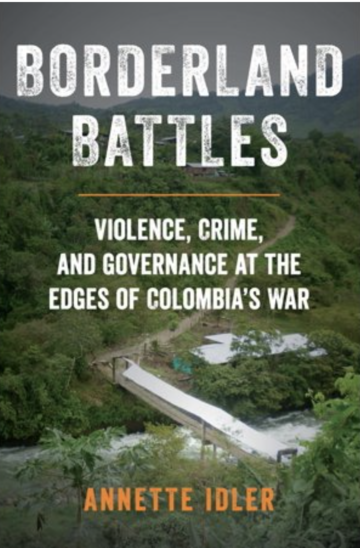
Report forum February 2020 available upon request
The report of the cross-stakeholder forum "The Double Crisis in the Colombian Borderlands: Addressing the Humanitarian-Security Nexus" held in Bogotá last February 2020 is available upon request.
Conflict and Wellbeing Deprivation in sub-Saharan Africa
A light sandwich lunch is served at 12.50pm. All are welcome.
Armed conflict inflicts damage and suffering to people at many levels. Surprisingly, many analyses of this connection fail to take into account that consequences of conflict on human life go far beyond physical harm and that it also deprives people of basic human entitlements. These often include access to adequate shelter, water, sanitation, knowledge and good health. Naturally, there is a need to take a people-centred approached on armed conflict in order to arrive at a better understanding of its relationship with peoples livelihoods. In assessing this connection, it is also vital to recognise that conflict and deprivations are constantly varying over time and space, and that many dimensions of peoples live are deeply intertwined. With this in mind, we present a quantitative analysis about how changes in actors (formal or informal), the incidence and intensity of conflict and environments of conflict (densely/sparsely populated spaces) are associated with changes in non-physical harm to people. We measure the latter by adopting a comprehensive notion of human deprivation, namely multidimensional poverty. We focus on three African countries: Nigeria, DR Congo and Ethiopia. All of them have been the setting of some of the most active armed conflicts during the last decade. At the same time, they are also home to some of the most deprived and poorest people globally according to several measures of poverty. Combining data from ACLED and two nationally representative household surveys for each country, we present a detailed analysis of the socioeconomic characteristics of households that are being affected by armed conflict and what aspects of their livelihoods are being touched. We discuss the stability of these patterns over time and space, as well as how they relate to changes in the considered structural dimensions of conflict in these countries
Christian Oldiges is a Co-Director of Metrics and Policy at the Oxford Poverty and Human Development Initiative (OPHI). He holds a Diploma (M.A. equivalent) and PhD in Economics from Heidelberg University. During his studies and research in Development Economics, he spent several years in India, studying and working at the Delhi School of Economics, Delhi University, the G.B. Pant Institute of Social Sciences, Allahabad, the Indira Gandhi Institute of Development Research (IGIDR), and the Indian Statistical Institute (ISI), Delhi. Prior to joining OPHI as a Research Officer in August 2016, Christian has been working as a Teaching Assistant in Development Economics at Heidelberg University and as a Research Assistant for OPHI since 2011. During his doctoral studies, his research focus was on evaluating welfare impacts of India’s National Rural Employment Guarantee Act (NREGA) and on designing the nutritional deprivation index (NDI). At OPHI, Christian undertakes micro-econometric research on the determinants of multidimensional poverty and is part of OPHI’s outreach team that supports governments in building national MPIs.
Ricardo Nogales C. is a Research Officer at OPHI since May 2018. He holds a BSc. and a MSc. In Economics and a PhD in Econometrics, all from the University of Geneva (Switzerland). Before joining OPHI, he was a Professor of Economics at the School of Economics and Finance of the Universidad Privada Boliviana in Bolivia and a Research Assistant at the United Nations Research Institute for Social Development (UNRISD) in Switzerland. He carried on research activities in the field of development economics, poverty reduction and human development with the IDB, UNDP, ILO, World Bank, Oxfam and IDRC. He has been an external consultant for several public organizations in Bolivia, including the Program for Strategic Research, the Central Bank, the Institute for Agricultural Insurance and the Ministry of Economics and Public Finance.
_____________
The presentation is a part of the CCW Tuesday Seminar Series hosted by the Conflict Platform.
"Fronteras" An article about CONPEACE in a Colombian Newspaper
Professor Fernando Cepeda wrote an article on the latest Cross-Stakeholder forum by CONPEACE and Dr Idler's research.
"No se había escrito un trabajo tan completo como el de la profesora Annette Idler sobre las fronteras colombianas, principalmente la colombo-venezolana y la colombo-ecuatoriana." Febrero 28, 2020
Dr Jan Boesten at the Changing Character of War Seminar Series
Dr Jan Boesten will present his research "Uncertainty and Mutual Recognition in Colombia - the Study of the Nature of Armed Non-State Actors in the Colombian Conflict" at the Changing Character of War Seminar Series. February 18, 2020.
Dr Annette Idler Speaking at the CID Speaker Series
Dr Idler will be discussing the finding of her book "Borderland Battles: Violence, Crime, and Governance at the Edges of Colombia’s War " on the Centre for International Development at Harvard University. February 14, 2020
The latest podcast of the Growth Lab, Harvard University features Dr Annette Idler
The Double Crisis: Insecurity and Humanitarian Plight at the Colombia-Venezuela Border
"In this Growth Lab podcast, Research Assistant Ana Grisanti interviews Annette, who discusses how the so-called border effect has facilitated violence, undermined trust relationships, attracted numerous violent non-state groups, and obscured the nuanced realities of multiple insecurities." January 29,2020
Dr Markus Hochmüller joins the CONPEACE team
Dr Hochmüller will be part of the CONPEACE team as a Postdoctoral Research Fellow. He is also the Co-PI of the research project “The Comeback of the Latin American Armed Forces” (funded by the Oxford/Berlin Research Partnership). Markus holds a PhD in political science from Freie Universität Berlin, where he has worked as a Research Associate at the Collaborative Research Centre 700 – ‘Governance in Areas of Limited Statehood’, and as a Lecturer in Latin American Politics at the Institute for Latin American Studies. January 20,2020
Conflict Platform collaborates with the UN System Staff College
The Changing Character of War Centre at Oxford University collaborates on the UN System Staff College course “Analysing and Understanding Non-state Armed Groups” by integrating findings and tools from the Changing Character of Conflict Platform into the course content. Dr Annette Idler serves as the academic lead for the courses. By focusing on multidisciplinary investigative approaches, this course explores the political context driving the genesis of armed violence and the forces shaping group cohesion, resource strategies, internal structures and levels of violence. The course aims at building the capacity of UN staff to better understand the nature and actors of current armed violence.
Enrollment deadline: 18 October
Contact: peacesecurity@unssc.org
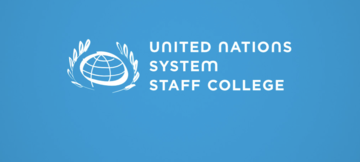
Dr Dáire McGill at the Changing Character of War Centre Seminar Series
Dr Dáire McGill presented “Marginality, (in)security and political participation in conflict and beyond” at the Changing Character of War Centre Seminar Series. December 5, 2019.
Dr Annette Idler at the David Rockefeller Latin American Center, Harvard University
Dr Annette Idler discussed the security situation at the Colombia-Venezuela border at a Roundtable event hosted at the David Rockefeller Latin American Center, Harvard University. November 19, 2019.
Dr Annette Idler at Brown University
Dr Annette Idler was invited to present the findings and policy implications of her book “Borderland Battles: Violence, Crime, and Governance at the Edges of Colombia’s War” at Brown University. November 14, 2019
Dr Annette Idler at a United Nations University event in New York
Dr Annette Idler was invited to talk about her book “Borderland Battles: Violence, Crime, and Governance at the Edges of Colombia’s War” at a United Nations University event in New York. The book was discussed by UN Under-Secretary-General Fabrizio Hochschild. November 1, 2019.
Dr Annette Idler at the Weatherhead Center Forum at Harvard University
Dr Annette Idler was invited to present her work on the implementation of the Colombian peace process at the Weatherhead Center Forum at Harvard University, October 30, 2019.
Dr Jan Boesten Wins Extension to Grant for Colombia Research
Dr Jan Boesten has been awarded a year extension to his grant from the Fritz-Thyssen-Stiftung Foundation. October 29, 2019
Dr Annette Idler at the CLAIS Colloquia, Yale MacMillan Center
Dr Annette Idler was invited to talk about her book at the “CLAIS Colloquia: Book discussion with Annette Idler - Borderland Battles: Violence, Crime, and Governance at the Edges of Colombia’s War” at the Yale MacMillan Center Council on Latin American and Iberian Studies (CLAIS). October 23, 2019.
Dr Idler's post for London School of Economics' Blog
Cross-border Conflicts and their Connections: The Case of the African Great Lakes and South Sudan
A light sandwich lunch is served at 12.30pm. All are welcome.
Based on the novel methodology developed by project The Changing Character of Conflict Platform, this roundtable addresses connections between the conflicts in the African Great Lakes region and South Sudan. We start by introducing our methodology suggesting a new approach to the analysis of complex conflicts together with visualisations of spatiotemporal conflict dynamics. Subsequently, we focus on actual as well as potential (future) connections between the two conflicts. In addition, we discuss flows between those two regions, such as migration of people, as potential connectors. The roundtable concludes with the practitioners’ viewpoints on the main challenges in addressing cross-border conflicts and the flows that connect them and suggests possible solutions.
Annette Idler - Director of Studies at the Changing Character of War Centre, University of Oxford
Kate Tkacova - Post-doctoral Research Fellow at the Changing Character of War Centre, University of Oxford
Chloe Lewis - Development Impact Evaluation (DIME), World Bank
Adrian Garside - Research Fellow at the Marjan Centre for the Study of Conflict and Conservation, King’s College London
Carlos Vargas-Silva - Research Director and Associate Professor at the Centre on Migration, Policy, and Society (COMPAS), University of Oxford
Michael Comerford - Team Leader on the DFID South Sudan Peacebuilding Opportunities Fund, Oxford Policy Management (OPM)
Conflict, Crime and Illicit Flows
Jean-Luc Lemahieu, the United Nations Office on Drugs and Crime (UNODC)
A light sandwich lunch is served at 13.20pm. This event is free - register here.
In this lunchtime event, Jean-Luc Lemahieu, Director of the Division for Policy Analysis and Public Affairs (DPA) of the United Nations Office on Drugs and Crime (UNODC), will discuss how illicit flows are undermining global security. Drawing on his own field experience, he will outline how the illicit drug trade has been interlinked with armed conflict and crime in regions such as Afghanistan and Myanmar, and what policies have failed or succeeded in tackling this challenge.
This event will be chaired by Dr Annette Idler and is co-hosted with the Changing Character of War Centre’s Conflict Platform project and the Blavatnik School of Government.
Lemahieu was appointed Director of the DPA at the UNODC in December 2013. Before taking up this position in Vienna, he gained 20 years of field experience, serving in various countries challenged by political economies heavily dependent on drug cultivation, including Afghanistan and Myanmar, and in transit regions such as Central Asia and the Caribbean. His first appointment with the United Nations dates back to 1990, as a Junior Professional Officer with the United Nations Industrial Development Organization (UNIDO) assigned to the Republic of Korea. Lemahieu is a licensed jurist with a postgraduate degree in international law.
"Borderland Battles" review by Jorge Botero
An article reviewing Dr Idler's book has been published in a national newspaper. "Son pocos los estudiosos que se han ocupado de analizar, a partir del conocimiento directo de las áreas asediadas por la violencia, las tragedias de quienes en ellas viven." April 8, 2019 Full article
The Changing Character of Conflict: Rethinking Conflict Shapes
Dr Annette Idler speaks at the KU Leuven about “The Changing Character of Conflict: Rethinking Conflict Shapes”. See more.
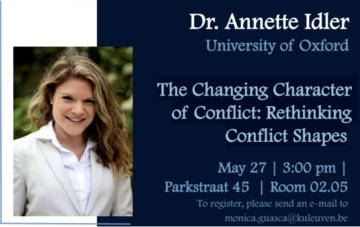
New article: A borderland lens on hubs of protracted conflict
Annette Idler together with Yadaira Orsini (Oxford Project Management) and Natasha Leite (Danish Demining Group) published their article introducing a new epistemological approach to borderlands and hubs of protracted conflict.
Borderlands in vulnerable regions are spaces where the nexus between conflict, crime, and politics are at their most dynamic. They are places of opportunity but also of heightened risk. Borderlands play a crucial role in today’s conflicts, whereby communications, finance, crime, and ideas flow constantly across these. Such a complex environment makes these conflicts more resistant to resolution through negotiated settlements. This unique set of characteristics represents a considerable challenge for policymakers, whose current suite of policy responses are ill equipped to deal specifically with borderlands. This is largely because they are confined to state-centred approaches. The very tension that arises from state-centric views that attach importance to the borderline, and the transnational flows that cross it in border areas, epitomise the challenge that we face in solving protracted cross-border conflicts through an international system that is predominantly defined by state borders. Borderland characteristics and the increasingly cross-border nature of conflict defy the traditionally state-centric ‘rules of the game’ by which most organisations and country structures operate, creating a significant challenge for engagement that has yet to be addressed in a meaningful way. This paper sets out to meet this challenge by introducing a new epistemological approach to borderlands and hubs of protracted conflict that can enhance our understanding of the dynamics in such contexts. It aims to promote a useful framework for academia, practitioners, and policymakers alike to engage in these particularly complex environments.
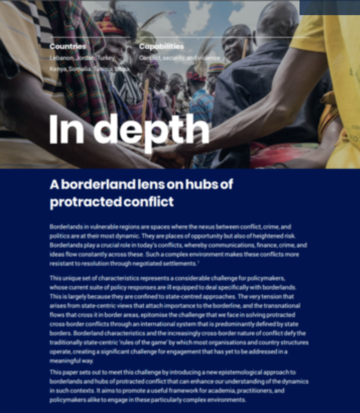
Conflict and Social Cohesion
Frances Stewart, University of Oxford
Arnim Langer, KU Leuven
A light sandwich lunch is served at 12.50pm. All are welcome.
Frances Stewart is emeritus professor of Development Economics, University of Oxford. She was Director of the Oxford Department of International Development (1993-2003) and the Centre for Research on Inequality, Human Security and Ethnicity (2003-2010). She has been an adviser to the UNDP’s Human Development Report since its inception in 1990. She was Chair of the United Nation’s Committee for Development Policy (2010-2012) and vice-chair of the International Food Policy Research Institute (IFPRI) (2004-6). Her prime recent research interests are horizontal inequalities, conflict and human development. Among many publications, she is the leading author of Horizontal Inequalities and Conflict: Understanding Group Violence in Multiethnic Societies (2008) and Advancing Human Development: Theory and Practice ((2018).
The seminar will cover two major issues relating to horizontal inequalities:
- The importance of perceptions of inequality as a source of action; and the relationship of perceptions of horizontal inequalities to ‘objective’ measures, including both socio-economic inequalities and political inequalities.
- The relationship of horizontal inequalities and democracy. This will include a discussion of why and when one would expect such a relationship, in terms of both political and socio-economic inequalities, and some empirical evidence on the relationship.
Arnim Langer is Director of the Centre for Research on Peace and Development (CRPD), Chair Holder of the UNESCO Chair in Sustainable Peacebuilding and Associate Professor of International Politics at KU Leuven. He is also associate researcher at the Oxford Department of International Development (ODID), Research Associate at the Southern Africa Labour and Development Research Unit (SALDRU) at the University of Cape Town (UCT) & Alexander von Humboldt Fellow at the University of Heidelberg in Germany. He has published extensively on issues of ethnicity, horizontal inequality and conflict in a range of absolute top journals, including Political Analysis, African Affairs, World Development, Foreign Affairs, Democratization, Social Science Computer Review and Social Indicators Research.
Dr Annette Idler at the Graduate Intitute, Geneva
"Borderland Battles" book launch at the Graduate Institute in Geneva. Discussion around the security challenges for individuals in a conflict-crime context. April 4, 2019
A Westphalia for the Middle East?
Dr Patrick Milton, University of Cambridge
A light sandwich lunch is served at 12.50pm. All are welcome.
It was the original forever war, which went on interminably, fuelled by religious and constitutional disputes, personal ambition, fear of hegemony, and communal suspicion. It dragged in all the neighbouring powers. It was punctuated by repeated failed ceasefires. It inflicted suffering beyond belief and generated waves of refugees. This description could apply to Syria today, but actually refers to the Thirty Years War (1618-48), which turned much of central Europe into a disaster zone. The Thirty Years War is often cited as a parallel in discussions of current conflict in the Middle East. The Peace of Westphalia, which ended the war in Europe in 1648, has featured strongly in such discussions, usually with the observation that recent events in some parts of the region have seen the collapse of ideas of state sovereignty -ideas that supposedly originated with the 1648 settlement. This talk will discuss the parallels between the Thirty Years War and today’s Middle East and suggest ways in which lessons drawn from the congress and treaties of Westphalia might provide inspirations for a peace settlement for the Middle East’s new long wars. The talk is based on a recent book and ongoing collaborative project.
Patrick Milton was born in Zimbabwe and is a German-British research fellow at Peterhouse, Cambridge, and an affiliated lecturer at the Dept of Politics and International Studies, Cambridge. He was previously a postdoc at Freie Universitaet Berlin and has been working on the ‘Westphalia for the Middle East’ project since 2016.
_____________
The presentation is a part of the CCW Tuesday Seminar Series hosted by the Conflict Platform.
Dr Annette Idler discussed her findings of her timely new book "Borderland Battles" at WOLA
"Dr Idler’s work offers a more holistic and nuanced understanding of “people-centered security” than has been available so far. It has also given her detailed knowledge of the Colombia-Venezuela border zone, which is suffering important consequences of Venezuela’s crisis." April 1, 2019
Borderland Battles: Violence, Crime and Governance at the Edges of Colombia's War" Book Released
It is a privilege for the CONPEACE programme to announce the recent release of our Project Director Annette Idler's new book "Borderland Battles: Violence, Crime and Governance at the Edges of Colombia's War". It is an essential piece to have a better understanding of our current regional security dynamic, and the security landscape in the borderlands from a people-centred approach. Official launching will be on May 1, 2019, at Pembroke College, University of Oxford.
Dr Julia Zulver's Latest Article on Gender Violence for The Washington Post
Violence against Women and girls as a result of the Venezuelan migration and Colombia's armed conflict increases, but media is focused on the aid delivery and the political disputes between Maduro and the opposition.
Dr Annette Idler's Latest Article for The Conversation
CONPEACE research shows how the absence of basic services in border communities fuels crime, prostitution, and begging. These tensions and the emerging xenophobic discourses have become an explosive mix that threatens the security of the individuals, and the stability of the frontier.
Dr Jan Boesten's Latest Article on Colombia’s New Gun Law
"Colombia's New Gun Law Could Invoke Another Episode of Violent Vigilantism".The Globe Post. 22 January 2019
Dr Annette Idler's Insights on the Venezuelan Crisis for BBC World Service
Venezuela Crisis: Defectors fear for families under Maduro government. Discussion in the BBC World Service on why military intervention in Venezuela would risk leading to messy cross-border conflict, increase in organised crime and undermine fragile Colombia's Peace Accord. More diplomatic measures are crucial. Intervention starts at 27:57
Workshop of The Changing Character of Conflict Platform project
The AHRC-ESRC funded project The Changing Character of Conflict Platform: Understanding, Tracing and Forecasting Change across Time, Space and Cultures organized a closed workshop in December 2018 at All Souls College. The workshop brought together team members, advisors, collaborators, and selected external contributors of the project.
We had a stimulating discussion on conceptual as well as theoretical topics related to the five dimensions of conflict and changes across time, space, and cultures. Thanks to the participants representing the Social Sciences, Arts, Humanities, STEM and practitioners, we approached these topics from various methodological and epistemological perspectives and gained unique insights. At the end of the workshop, we set a plan for future collaboration.
We would like to express our deep appreciation for all who participated in the workshop.
The Constitution of Illicit Orders: Contested Sovereignty in Territorial Domains
Dr Christopher Lilyblad, The Changing Character of War Centre (University of Oxford)
A light sandwich lunch is served at 12.50pm. All are welcome.
Within the context of modernity and globalisation, this research project investigates the processes by which governance arises in territories subjected to illicit forms of social order that contest state sovereignty and authority. Drawing from recursive theoretical and empirical research rooted in the ‘abductive’ method of Pragmatism, the analysis has three principal objectives: First, it offers a different conceptual approach by moving away from negative categorisation of the phenomena, e.g. failed states, ungoverned spaces, limited statehood etc., towards a positive conceptualisation, i.e. illicit orders. By casting off the legal-rational, sovereign-territorial lens, the pursuant conceptual reconfiguration of territory, authority, and institutions recognises and more directly conveys the existence of local social organisation apart from the modern state via the agency of social groups acting in violation of domestic and/or international legal norms, rules, and institutions. Second, it seeks to explain the constitution of ‘illicit orders’ by offering a sociologically-cognisant analytical framework capable of elucidating the ‘micro’ processes inherent to governance in territories where state institutions remain nominal and ineffective. Based on insights from theoretically-informed empirical fieldwork in the favelas of Rio de Janeiro, Brazil, I maintain that inter-subjective relations of authority can be produced when a given actor asserts predominance in three co-constitutive domains; namely, organised violence, socioeconomic security, and social legitimacy. Resultant authority then gives rise to the ‘structuration’ of norms, rules, and institutions, which also recursively reinforces the institutionalisation of authority – a process inherent to the constitution of social order in these circumscribed territories. Third, it provides an understanding of how inherently local ‘illicit orders’ at once form part of a diffuse mosaic of social, political, and economic structures that collectively constitute ‘global society’, while simultaneously existing in dramatic juxtaposition to the ‘international order’ of states within it.
Dr Christopher Lilyblad is currently a Visiting Research Fellow at the Changing Character of War Centre. He returns to academic life after spending working at European Union Delegation in Cape Verde (2014-16), the Luxembourg Development Cooperation Agency – LuxDev (2016-2017), and Luxembourg’s national NGO platform, the Cercle de Coopération (2017-2018). In October 2017, Dr Lilyblad was elected as Councillor in his native municipality of Betzdorf, Luxembourg.
_____________
The presentation is a part of the CCW Tuesday Seminar Series hosted by the Conflict Platform.
The Law and Practice of Cross-border Humanitarian Relief Operations: Syria as Case Study
Dapo Akande (University of Oxford), Emanuela-Chiara Gilliard (University of Oxford, European University Institute)
A light sandwich lunch is served at 12.50pm. All are welcome.
The extremely severe restrictions on humanitarian operations have been one of the defining features of the Syrian conflict. Humanitarian operations have been severely impeded by a range of constraints, including active hostilities, repeated attacks against those providing humanitarian and, in particular, medical assistance, shifting front lines, proliferation of parties to the conflict, and the instrumentalisation of assistance by all belligerents. It is unquestionable though that a principal impediment have been the constraints imposed by the Government of Syria, particularly, but not exclusively, on relief operations for people in opposition-held areas. These were so severe that, following repeated requests to allow and facilitate rapid and unimpeded access, that went unheeded, the Security Council took the unprecedented step of authorising cross-border and cross-line operations without the need for the consent of the Government of Syria, in Resolution 2165 (2014). Prof Dapo Akande and Emanuela Gillard will discuss the legal framework regulating cross-border relief operations and how it has been modified by the Security Council in the Syria crisis. They will offer some reflections on what this had meant operationally in Syria and beyond.
Dapo Akande is a Fellow of Exeter College and Co-Director of the Oxford Institute for Ethics, Law and Armed Conflict (ELAC).
Emanuela-Chiara Gilliard is a Senior Research Fellow at ELAC, a Research Fellow in the Individualisation of War Project at the European University Institute in Fiesole and an Associate Fellow in Chatham House’s International Law Programme.
_____________
The presentation is a part of the CCW Tuesday Seminar Series hosted by the Conflict Platform.
Rebel Diplomacy: Territoriality, Identity and the ‘Foreign’ Affairs of Non-State Armed Groups
Dr David Brenner, University of London
A light sandwich lunch is served at 12.50pm. All are welcome.
Recent scholarship highlights the multifaceted nature of non-state armed movements, raising important questions about their internal politics and their governance of territory and civilians, i.e. their ‘domestic’ politics. What has received little attention, however, are the ‘foreign’ affairs of non-state armed groups. In times where civil wars are increasingly internationalised and non-state armed groups conduct sophisticated diplomacy with states, international governmental and non-governmental organisations and other non-state armed groups, this paper attempts to address this shortcoming by asking fundamental questions about the nature of rebel diplomacy: How do rebel diplomats conceive of their international environment and meaningful action that can be pursued in relation to it? How does the internal dimension of rebel groups, including armed group fragmentation, and their domestic sphere, including their relations to civilians, shape their foreign relations? In addressing these questions, we propose a conversation between the literatures on non-state armed groups in Comparative Politics with Foreign Policy Analysis in International Relations. While the latter is traditionally concerned with state-to-state interactions, we argue that it makes for a useful starting point for understanding the foreign relations of non-state armed groups that command territory and conduct themselves as de-facto states. The paper draws on long-term fieldwork on ethno-national rebel movements in Myanmar, particularly the Kachin Independence Organisation (KIO) and the Karen National Union (KNU), to explore and elucidate its main arguments.
David is Lecturer in International Relations. He researches and teaches on the politics of conflict, security and development.
_____________
The presentation is a part of the CCW Tuesday Seminar Series hosted by the Conflict Platform.
Gender, State-collapse, Conflict and State-building: Recent Research from the Somali Context
Judith Gardner, Rift Valley Institute
A light sandwich lunch is served at 12.50pm. All are welcome.
Prescribing and policing gender norms and relations, in other words controlling society’s experiences of femininity and masculinity, along with social exclusion practices, is arguably at the very heart of the protracted and violent struggle for political and ideological power in today’s Somalia. The research material that my session will be drawing on comes from two recent qualitative studies: the Impact of War on Somali Men (Rift Valley Institute) and Learning from Kismayo: a study of women’s roles and responsibilities in clan-related armed violence in the Somali conflict (Life & Peace with Peace Direct). The second study was prompted by the widespread exclusion of Somali women from peace processes and political settlements. Together, the studies’ findings provide a detailed picture of the gendered dynamics and impacts of Somalia’s post-1991 violence. They deepen understanding of the complex power and gender relations at play in the context of an absent, weak or fragile state. At the same time, they give rise to many new questions, some of which we can perhaps discuss during the session.
Judith has worked in development and peacebuilding for 30 years, as a practitioner and researcher, developing a particular focus on gender and conflict. As a researcher, uses she participatory approach and qualitative methods. Among many others, she authored a ground-breaking conception study with the Rift Valley Institute on war’s impact on Somali men.
_____________
The presentation is a part of the CCW Tuesday Seminar Series hosted by the Conflict Platform
From “All Art is Propaganda” to All Propaganda is Marketing
Alexander L. Fattal, Pennsylvania State University
A light sandwich lunch is served at 12.50pm. All are welcome.
As scholars from a range of disciplines have compellingly argued, the boundary between war and peace has grown more faint through the Global War on Terror. The concatenating series of global episodes that could happen most anywhere at nearly any time remediates the global scope of the Cold War, but in such a way that has enabled a more mutable cast of smaller non-state actors to proliferate. This scaling down toward the level of the individual has meant a shift in the methods of targeted persuasion to mobilize fighters, affect morale, and prompt defection. Increasingly the skills and knowledge from the world of consumer marketing is being brought to bear in these propaganda battles. This talk explores how branding’s ability to manage the visible and invisible dimension of the production of commodities is being applied to armed conflicts. I take up this issue through the prism of an ethnographic analysis of the Colombian government’s efforts to demobilize individual guerrillas from the Revolutionary Armed Forces of Colombia (FARC) and Army of National Liberation (ELN) between 2003 and 2016.
Alexander L. Fattal is assistant professor in the Departments of Film-Video and Media Studies and Anthropology at Pennsylvania State University. He is author of Guerrilla Marketing: Counterinsurgency and Capitalism in Colombia (University of Chicago Press, 2018).
_____________
The presentation is a part of the CCW Tuesday Seminar Series hosted by the Conflict Platform
War & Peace and Space: Presentation by Dr Nikita S.W. Chiu
At the peak of the Cold War, the Apollo-Soyuz Test Project demonstrated successful docking of US and Soviet modules in orbit. The project illustrates that international co-operation could be possible even under the most testing political environment. As the Outer Space Treaty which calls for the peaceful exploration and use of outer space celebrates its fiftieth anniversary, the international community witnesses mounting pressure on space resources and competitions in outer space. Against the backdrop of recent debates on the potential establishment of a “Space Force” and UK’s exploration of an alternative satellite system to rival Galileo, can peace in space be sustained or would it be rendered a mere romantic concept?
Dr Chiu is Research Fellow in Robotics and Outer Space at the Centre for Technology and Global Affairs at the University of Oxford. She is also a Research Affiliate at the Centre for the Study of Existential Risk at the University of Cambridge. Her work examines the impact that technologies have on international relations and the international order, with a specific focus on space and quantum technologies, as well as highly autonomous systems. Combining her teaching background in Chinese foreign policy, security, and global governance, she will investigate the socio-economic and political implications associated with recent space policy developments in the upcoming talk. The presentation will also include an attempt at answering the newly announced £92m question - Can a British Global Navigation Satellite System be feasible?
Reception immediately following
Introducing the Changing Character of Conflict Platform Project: New approach to quantitative analysis of protracted conflicts
Dr Katerina Tkacova, CCW, University of Oxford
A light sandwich lunch is served at 12.50pm. All are welcome.
The interdisciplinary project aims to create a knowledge-based platform for academics, practitioners, policy-makers and the wider public to understand the changing character of conflicts across different epistemologies and methodologies. While we might not be able to stop some conflicts, we may well be able to prevent a drastic increase in casualties or erosion of social fabric if we understand the main patterns of organized violence. In our work, we focus on the following dimensions of conflict and the changes within them: actors involved in conflicts, methods used in conflicts, resources that drive conflicts, environments in which conflict takes place, the impact of conflict on individuals and societies.
In the presentation, we introduce a new approach to quantitative analysis of protracted conflicts, which is one of the components of the project. Those conflicts often change their location, spread across borders and create new spin-off conflicts or escalate the old ones. To capture the dynamic and complexity of protracted conflicts, we draw new geographical units based on the activity of carefully identified relevant conflict actors. Using data from various sources including the Georeferenced Events Dataset (UCDP) and the PRIO-GRID (PRIO), we select important indicators to convene a comprehensive yet concise analysis which is designed to inform policy-makers involved in violence reduction and conflict reconciliation. The new approach to quantitative conflict analysis allows us to identify patterns of changes in time and space in the five dimensions of conflicts – actors, methods, resources, environments and impact.
Katerina Tkacova is a post-doctoral research fellow at the Changing Character of Conflict Platform at the University of Oxford since May 2018. Before joining the University of Oxford, Katerina taught at the University College London, King’s College and the University of Essex. Her teaching experience ranges from Quantitative Methods, Comparative Politics and Conflict Analysis. Katerina’s research interests include political violence, ethnic groups and quantitative research methods.
_____________
The presentation is a part of the CCW Tuesday Seminar Series hosted by the Conflict Platform
The Changing Character of Conflict and the Work of the United Nations on Terrorism
Elizabeth Joyce, United Nations
A light sandwich lunch is served at 12.50pm. All are welcome.
Since 2014, the changing nature of threats to international peace and security, in particular, the threat posed by terrorism, has demanded a more rapid pace of change in policy-making at the United Nations and has, in part, led to wider institutional reform within the organization aimed at developing a One UN approach to counter-terrorism. In addition, increasingly complex terrorist threats have led to a broadening of the informational and analytical resources available to inform the work of the Security Council, following demands from its Member States for a more granular and dynamic analysis of threats; and a greater willingness on the part of the Security Council to entertain engagement with civil society and academia, aimed at increasing the impact of multilateral efforts on counter-terrorism.
Elizabeth Joyce is Chief for Asia-Pacific and the Americas at the Counter-Terrorism Committee Executive Directorate (CTED), a subsidiary organ of the United Nations Security Council. She has an M.Phil. in Latin American Studies and a D.Phil. in Politics from Oxford University, where she was a member of St. Peter’s College.
_____________
The presentation is a part of the CCW Tuesday Seminar Series hosted by the Conflict Platform
Conflict Platform collaborates with the UN System Staff College
The Changing Character of War Centre at Oxford University collaborates on the UN System Staff College course “Analysing and Understanding Non-state Armed Groups” by integrating findings and tools from the Changing Character of Conflict Platform into the course content. Dr Annette Idler serves as the academic lead for the courses. By focusing on multidisciplinary investigative approaches, this course explores the political context driving the genesis of armed violence and the forces shaping group cohesion, resource strategies, internal structures and levels of violence. The course aims at building the capacity of UN staff to better understand the nature and actors of current armed violence.
The target audience is midlevel UN personnel but the course s also open to INGOs, NGOs, academia, think tanks, donor representatives etc.
Enrolment deadline: 16 October
Contact: peacesecurity@unssc.org

Responding to Sexual Violence in Conflict: Fighting Impunity in DRC
Chloe Lewis, University of Oxford
A light sandwich lunch is served at 12.50pm. All are welcome.
Sexual violence in conflict once again captured the international spotlight earlier this month when gynaecologist, Dr Denis Mukwege, and human rights activist, Nadia Murad, were jointly awarded the Nobel Peace Prize. Responding to sexual violence grew exponentially in importance on international policy agendas over the past decade, with clear implications for operational and programmatic practice across conflict-affected contexts. The adoption of UN Security Council resolution 1820 (2008) – establishing sexual violence as a threat to international peace and security – marked a clear turning point in this regard. While pervasive across many armed conflicts, testimonies of sexual violence documented in eastern DRC were an important focus of such institutional developments. In effect, these experiences became somewhat defining of the nature of the harm, its victims and its perpetrators. Focusing on the ‘male perpetrator,’ this paper first examines how, why, and with what effect gendered and raced imaginaries became encoded in international peace and security policy. Doing so, it emphasises the role of institutional imperatives and political dynamics in shaping international policy definitions of sexual violence in the Council. Subsequently, exploring efforts to fight impunity for sexual violence in DRC, presentation foregrounds how, and with what effect, this clearly delineated policy definition obscures more complex realities in DRC.
Chloé is completing her PhD in International Development at the University of Oxford where she is researching responses to sexual and gender-based violence in the Democratic Republic of Congo. Drawing on extensive research conducted at the United Headquarters in New York and in DRC between 2013-2017, her dissertation examines the development of internationally-driven responses to sexual violence, including at the level of the UN Security Council, and their operationalisation in DRC.
_____________
The presentation is a part of the CCW Tuesday Seminar Series hosted by the Conflict Platform
Colombia's New Presidency and the Protection of Social Leaders. e-ir.info, 18 August, 2018. Dr Jan Boesten and Dr Annette Idler.
The government can benefit from civil society's expertise and give them a central role in the process of bringing institutionality to Colombia's marginalized regiones, write Jan Boesten and Annette Idler in E-International Relations.
https://www.e-ir.info/2018/08/18/colombias-new-presidency-and-the-protection-of-social-leaders/
Seminar with Mike Martin on ‘Why We Fight’
CCW’s Conflict Platform team is delighted to host Mike Martin for a seminar on ‘Why We Fight’, drawing on his recently published book of the same name. Dr Mike Martin is a Visiting Research Fellow at the Department of War Studies, King’s College London.
When we go to war, morality, religion and ideology often take the blame. Mike argues that the opposite is true: rather than driving violence, these things help to reduce it. While we resort to ideas and values to justify or interpret warfare, something else is really propelling us towards conflict: our subconscious desires, shaped by millions of years of evolution.
His previous books include An Intimate War: An Oral History of the Helmand Conflict and Crossing the Congo: Over Land and Water in a Hard Place, the latter of which was shortlisted for the Edward Stanford Adventure Travel Writing Award in 2016.
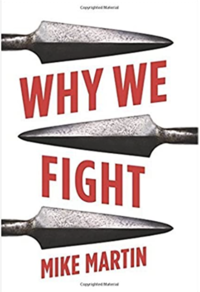
Challenges in Colombia's Changing Security Landscape, May 2018
The University of Oxford’s CONPEACE (From Conflict Actors to Architects of Peace) Program at the Changing Character of War Centre, together with Bogota’s Rosario University and the Simon Bolívar University in Cúcuta, organized a one-day, cross-stakeholder workshop in Bogotá prior to the presidential elections to discuss the changing security landscape in Colombia.
The workshop brought together stakeholders from Colombia’s civil society (both urban and rural), the UNHCR (the United Nations High Commissioner for Refugees) and the UN Mission to Colombia (as representatives of the international community), the national government, and national and international academics.
The following articles explore some of the most important insights from our debates. Three points were essential: first, our understanding of security issues can benefit greatly from employing human and citizen security lenses that go beyond mere military presence throughout the national territory; second, the peace process with the FARC is not reversible and should be seen as an opportunity for the new government to create sustainable peace; third, the national government can learn from the collective action and community organizing of civil society in marginalized regions to improve long-term, people-centered security.
Lasa International. Vol 49
Dr Annette Idler Highly Commended in O2RB Excellence in Impact Awards
Dr Annette Idler, Pembroke Senior Research Fellow and Director of Studies at the Changing Character of War Programme, has received a 'Highly Commended' Award at the inaugural O2RB Excellence in Impact Awards for her work on the Changing Character of Conflict: Violent Non-State Actors and Borderlands. (April 30 2018)
The O2RB Excellence in Impact Awards is a collaborative initiative between the University of Oxford, the University of Reading, the Open University and Oxford Brookes University to foster and celebrate achievements in social science research beyond academia.
A main objective of the Changing Character of Conflict project is to create a knowledge-based platform for academics, practitioners, policy-makers and the wider public to understand the changing character of conflict. The impact of this work is increasingly important in light of our global, changing security landscape.
Dr Idler’s work focuses on the Colombian Peace Process and the role of non-violent state groups in evolving climates of conflict, security and transnational organised crime. Her research combines ethnographic fieldwork with wider theoretical debates on security. This ‘glocal’ approach to people-centred security has aided major partners in the Colombian Peace Process, reducing conflict and civilian suffering in Colombia and other conflict zones; more widely, it has shaped ongoing debates surrounding wider conflicts.
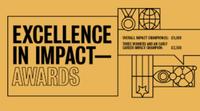
Dr Annette Idler at the House of Lords
Dr Annette Idler joined an expert panel on the current state of the Colombian peace process at the House of Lords, 14 May 2018.
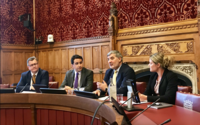
"Rethinking the Peace Negotiations in Colombia"
All are welcome to ‘Rethinking the Peace Negotiations in Colombia’, a conversation style event at 6.30pm, Monday 12 March in the Old Library, All Souls College, University of Oxford.
Participants will include HE Mr Néstor Osorio Londoño, Colombian Ambassador to the United Kingdom, Professor Eamon Gilmore, EU Special Envoy for the Peace Process in Colombia and Joaquin Villalobos, Peace Process Advisor to the Government of Colombia.
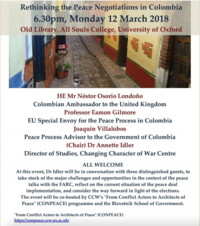
Project team members participate in 'Colombia After the Peace Accords' Conference
Dr Annette Idler chaired a session on the 'Challenges of Equitable Development', and Dr Jan Boesten spoke on 'Bringing Citizens Back In: Uncertainty in Colombia's Post-Agreement Context', as part of a programme which brought together academics and experts to focus on new challenges and new paths forward from a multidisciplinary perspective. 1 December, 2017
CCW hosts roundtable with Mariana Escobar, Director General of the Colombian Agency for Territorial Renewal
The Colombian Territorial Renewal Agency (ART) is the entity responsible for reactivating conflict affected rural areas of Colombia, with the goal of strengthening local governance capacities, in the aftermath of the peace agreement between the Colombian government and FARC.
This roundtable, arranged by the Changing Character of War (CCW) Centre at Pembroke College, Oxford, brought together a selected group of experts working on issues related to conflict, governance, and development in various regions across the world, to exchange experiences and research findings on such efforts and related policies with a view to enhancing the outcome for affected communities on the ground in a changing security landscape. 1 December, 2017
Dr Idler participates in the Annual Meeting of the Global Future Councils
Dr. Annette Idler attended the Annual Meeting of the Global Future Councils in Dubai, UAE, from 11-12 November 2017. Annette is a Global Future Council Fellow on the Future of International Security and contributes expertise on the changing character of conflict.
CCW Lunch Seminar Series - Florence Gaub
Florence Gaub presents on “Arab Wars: A Tale of State Survival” in the Tuesday Lunch Seminar Series at the Department of Politics and International Relations.
Dr Annette Idler speaks at United Nations University panel series on 'Preventing Tomorrow's Conflicts'
Dr Idler held a talk entitled "Will tomorrow's conflicts be for political power or for criminal profit?" at the 'Preventing Tomorrow’s Conflicts' speaker series at United Nations Headquarters in New York.
The 'Preventing Tomorrow’s Conflicts' speaker series is jointly hosted by the Permanent Mission of Australia to the United Nations and the United Nations University (UNU) Office at the United Nations. It aims to bring leading academics from around the world to the UN to discuss with policymakers how tomorrow’s conflicts may differ from today’s, what the drivers of tomorrow’s conflicts may be, and how the UN can help to prevent them. 28 November, 2017
CCW Lunch Seminar Series - Michael Gross
Michael Gross presents on “Soft War: The Ethics on Unarmed Conflict” in the Tuesday Lunch Seminar Series at the Department of Politics and International Relations.
Dr. Idler speaks at 2017 Human Security Conference
Dr. Annette Idler was invited to give a keynote lecture to the Seventh Istanbul Human Security Conference, ‘Human Security in Difficult Times’ which took place on 18-20th of October 2017. The conference explored how the concept and practice of human security is being affected by key political developments observable in the world today, including but not limited to the rise of populism, mass migration and displacement, the ongoing durability of many non-state armed groups, and the squeezing of civil society.
CCW presents House of Lords Panel on UK Defense Capabilities
The Changing Character of War Centre (CCW) presents the House of Lords Panel on UK Defense Capabilities. The main question that will be investigated is “How well is the United Kingdom prepared, in terms of defence and security, for the challenge and threats that lie ahead”.
CCW Lunch Seminar Series - Neil Ferguson
CCW Lunch Seminar Series host Neil Ferguson who speaks about “Giving up the Gun: Disengaging from Politically Motivated Violence in Northern Ireland”.
CCW Lunch Seminar Series - Dr. Rob Johnson
The End of Peace & Optimism: Assessing the Changing Character of War
Dr. Rob Johnson, Director of the Changing Character of War Centre, presents on changes and continuities in actors, methods, impact on civilians, resources and environments of war in the Tuesday Lunch Seminar Series at the Department of Politics and International Relations.
Peter Wilson organises workshop on pacification and counter-Insurgency in historical perspective
Professor Peter Wilson organsises the workshop workshop “Pacification and Counter-Insurgency in Historical Perspective” on 4 October in All Souls College at University of Oxford. Confirmed speakers include: Martin Bayly, Stephen Conway, Chris Doyle, Mike Finch, Jacqueline L. Hazelton, Alexander Morrison, John Slight, Christopher Tyerman, Rosemary Wall, and Hannah Whittaker. Please find more information here.
The terms ‘pacification’ and ‘counter-insurgency’ have contemporary and historical currency, but are scarcely neutral concepts. They imply studying conflict from the authorities’ perspective and can suggest that the containment or defeat of opponents is a desirable outcome. Analysis is often solution-based, examining present and past examples to inform how states and armed forces might combat opponents more effectively. However, are pacification and counter-insurgency simply the flipside of what others study as ‘resistance’ or ‘liberation struggles’? What is the dynamic between governments, armed forces, populations and other actors in these circumstances? How do the motives, strategies and practices of those involve differ between authorities confronting their own populations, and populations resisting external invasion or encroachment onto their land? Are such situations invariably bi-polar and asymmetrical, given the frequent involvement of third parties such as other states or non-state actors like humanitarian organisations? How do the differing perspectives of the authorities, their opponents, and third parties shape or dictate research methodology?
This one-day conference assesses whether the current terminology helps or hinders analysis. It will bring together historians and political scientists to foster a more holistic dialogue, and it will widen the spatial and temporal boundaries to explore these phenomena from late Roman antiquity through the wars of the French revolution, the era of imperial acquisition, twentieth-century decolonization, and modern wars of liberal intervention.
In so doing, it will address a range of themes and questions, including: does pacification have a tangible historical currency? How did the concept of emerge and how has it changed over time? Can we identify a common set of ideas and behaviours associated with it, or has its meaning always been fragmented and context-dependent? What is the relationship between pacification and notions of civilization and barbarism? What roles has violence played in theory and in practice? Can the concept of pacification explain behaviours during periods of conquest, consolidation, occupation, withdrawal, and liberal intervention? Does pacification still hold value as a lens for understanding the exercise of power in the contemporary world?
Dr Jan Boesten to speak at Forum on 25 years of the Colombian Constitutional Court
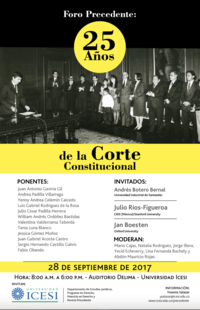
Dr. Idler joins global online brainstorm on security
Online, Twitter: @DebSecPlus
Dr. Annette Idler has been invited to speak at the online expert forum Debating Security Plus, an initiative of “Friends of Europe”, which brings together senior experts, leading think-tanks, institutes and other organisations to brainstorm on global security in all its forms. Annette speaks on the theme ‘From Hybrid to Asymmetric Warfare’ on 27 September 2017 between 4.00 – 5.00 pm UK time (GMT). Please find more informatio here.
The official Twitter account of Debating Security Plus is: @DebSecPlus Relevant contents will also be available from @friendsofeurope and @debatingeurope.
Our project contributes to the work of UN staff in violence-affected countries
Amman, Jordon
Dr. Annette Idler serves as academic expert advising UN staff from field offices in conflict-affected countries during a four-day inter-agency workshop organised by the UN Staff College. The course held in Amman, Jordan, quips UN personnel deployed in the region with theoretical and practical skills to analyse and understand the genesis and evolution of unconventional armed groups in violence-affected countries.
The workshop facilitated knowledge exchange between the research project “The Changing Character of Conflict Platform” led by Dr. Annette Idler and UN staff in the field. Building on research by Dr. Idler, the UN Staff College is in the process of producing its course material to inform everyday peace-building of UN personnel on the ground.
Dr Jan Boesten writes for The Conversation
Dr. Idler presents at PaCCS
Dr. Annette Idler speaks about organised crime in conflict zones at the Partnership for Conflict, Crime and Security Studies Policy Late. Dr Annette Idler was accompanied by two fellow speakers, Dr. Tristam Riley-Smith, the former PaCCS Research External Champion and current TNOC Research Integrator and Associate Fellow at the Centre for Science and Policy, University of Cambridge, and Professor Theo Farrel, Dean of Arts and Social Sciences, City, University of London. The event led to a constructive discssuion between practitioners, academics and policy makers about the intellectual and political relationship between organised crime and conflict, as well as the practical implications of doing work in and engaging with conflict zones where organised crime plays an important role.
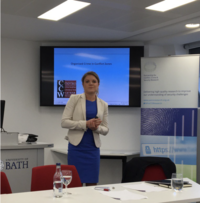
Dr Annette Idler writes for the Washington Post
Dr. Idler holds ECPR Lecture
Dr. Idler holds ECPR Keynote Lecture at the University of Bath
Dr. Annette Idler holds a key note lecture entitled “Organised Crime, Conflict and Politics: Arrangements of Convenience?” at the ECPR Standing Group on Organised Crime (SGOC) at the University of Bath.
Dr. Idler briefs UN staff at the UN Secretariat
Dr. Idler meets and discusses with UN staff at the UN Secretariat in New York, USA.
Dr Idler gives policy briefing at the US State Department
Washington D.C., USA
Dr. Annette Idler meets and discusses with officials at the U.S. State Department.
Dr. Idler presents at the IR Society Oxford
Trinty College, Oxford
Dr. Annette Idler presents on the topic “The convergence of conflict and organised crime” at the evening seminar of the Oxford International Relations (IR) Society. The event took place at Trinity College at the University of Oxford.
First inception workshop in Oxford
Inception Workshop for the Changing Character of Conflict Platform
Oxford, UK
An Inception Workshop for the “Changing Character of Conflict Platform“ project was held in the department on Friday 26 May. The workshop brought together team members, advisors, collaborators and external contributors to kick-start the 4-year project, which is funded by the UK Research Council’s Partnership for Conflict, Crime and Security Research.
Participants represented the Social Sciences, Arts, Humanities and STEM, with backgrounds in differing methodological approaches and various regional expertise, covering all cases selected for the project. After sharing perspectives on the actors, methods, environments, resources and impact of change in conflict, they focussed on reconciling methods and disciplines to inform the project’s direction.

Dr. Idler speaks at the Future of War conference
Washington D.C., USA
Dr. Annette Idler speaks at the Future of War conference 2017 organised by the New America Foundation in Washington, DC. The event features leaders from government, military, journalism, academia, and the private sector exploring questions of international security and defense.
Dr. Idler advises UN staff on changes in armed groups
Cairo, Egypt
Dr. Idler serves as academic expert for “Analysing and Understanding Armed Groups”, a three-and-a-half day course designed for UN staff. It is an inter-agency programme equipping UN personnel with theoretical and practical skills to analyse and understand the gensis and evolution of unconventional armed groups in violence-affected countries. The course takes place at the UN system staff college in Cairo. More information can be found here.
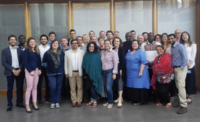
Dr. Rob Johnson gets Trench Gascoigne Prize from the Royal United Services Institute
On 12th December 2016 Dr Rob Johnson, Senior Research Fellow at Pembroke and Director of the Changing Character of War Programme, received first prize in the Trench Gascoigne Prize from the Royal United Services Institute. Dr Johnson was presented with the prize by the Chief of the Defence Staff, Air Chief Marshal Sir Stuart Peach. This annual essay prize has existed since 1874, and recognises original writing on contemporary issues of national and international defence and security.
Dr Johnson’s essay, titled ‘Making Strategy: The Changing Character of War in the Twenty First Century’, is concerned with the current situation for the United Kingdom’s defence. He examined the changing elements of warfare today and how certain ways of thinking can create a situation that leads to a significant strategic shock, just as 9/11 did in 2001. The essay was judged to be a critical appraisal of the problem.
GSP Visiting Fellow, Timor Sharan, speaks to Inside Story about the evolving security situation in Afghanistan.
GSP Visiting Fellow, Timor Sharan, speaks to Inside Story about the evolving security situation in Afghanistan on the back of talks between US officials and Taliban leaders. Click on the following link to watch: https://www.aljazeera.com/program/inside-story/2023/8/1/will-talks-betwe...

